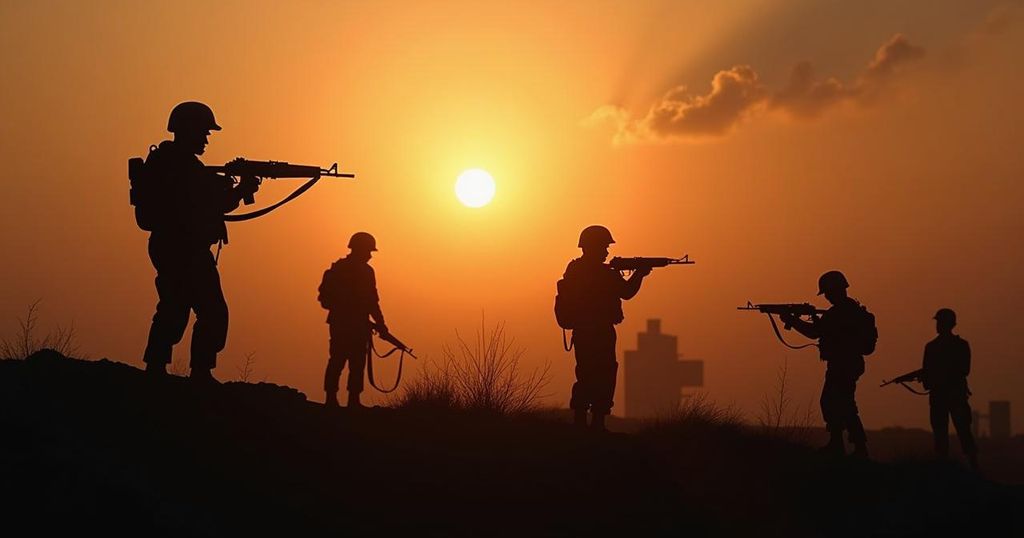Fierce cross-border conflict continues between Israeli forces and Hezbollah, with the IDF claiming responsibility for numerous operatives’ deaths. U.N. human rights officials condemn the military tactics employed as being akin to those used in Gaza, where humanitarian conditions are dire. The U.S. remains a supporter of Israel, despite political tensions, highlighting the intricate historical and geopolitical landscapes surrounding the ongoing conflict.
Intense hostilities persist along the Israel-Lebanon border as the Israel Defense Forces (IDF) engage in fierce confrontations with Hezbollah, resulting in the reported deaths of at least 50 Hezbollah operatives due to these recent military actions. U.N. human rights spokesperson Jeremy Laurence has publicly condemned the IDF’s conduct in Lebanon, equating it to the strategies employed during the ongoing Gaza conflict, describing the destruction in both regions as “beyond belief.” The broader context of the conflict includes the protracted Israel-Gaza war, which erupted over a year ago following an unprecedented attack by Hamas militants on October 7, 2023. This assault resulted in approximately 1,200 fatalities and numerous civilian hostages. In retaliation, Israel declared a state of war against Hamas, leading to a ground invasion that has caused significant displacement throughout the region since the establishment of the state of Israel in 1948. The death of Hamas leader Ismail Haniyeh in July 2024, attributed to an Israeli attack, further escalated tensions. In addition, Israeli airstrikes against targets in southern Lebanon have intensified, killing over 1,400 individuals, including Hasan Nasrallah, the long-standing leader of Hezbollah. This situation highlights the historical propensity for violence along the Israel-Lebanon border, which has deep roots stemming from the formation of Israel. Meanwhile, the Gaza Strip continues to grapple with a severe humanitarian crisis, with tens of thousands killed and half of the residents facing conditions akin to famine. Despite prevailing international calls for increased humanitarian support, Israel has maintained a stringent blockade on aid delivery into Gaza. In the U.S., political friction persists between Israeli Prime Minister Benjamin Netanyahu and certain American lawmakers, including President Biden, yet the United States continues to provide significant military aid and support to Israel, including backing measures in the United Nations aimed at staving off cease-fires during this ongoing conflict. The deep-seated historical mistrust and complexities of the Israeli-Palestinian conflict underscore the dire need for a comprehensive and durable resolution.
The Israel-Lebanon conflict has escalated significantly amid the ongoing war between Israel and Hamas, which began on October 7, 2023, following a surprise attack by Hamas that led to a substantial number of Israeli casualties. The retaliatory actions taken by Israel include a declared war on Hamas and military operations that have extended into Lebanon, primarily targeting Hezbollah. This complex situation is compounded by longstanding historical grievances that predate the establishment of Israel, involving intertwined narratives of violence, territorial disputes, and regional power dynamics. As humanitarian crises unfold in Gaza and escalating military engagements in Lebanon raise concerns, the international community remains keenly focused on the unfolding events.
In summary, the fierce fighting in Lebanon marks a significant escalation in the ongoing Israel-Gaza conflict, with both regional and international implications. The IDF’s military engagements with Hezbollah, coupled with severe humanitarian issues in Gaza, highlight the urgent need for diplomatic intervention. The repercussions of these conflicts reflect the deep-rooted complexities of historical animosities in the region, emphasizing the criticality of establishing peace to mitigate the suffering of civilians affected by the violence.
Original Source: www.washingtonpost.com







